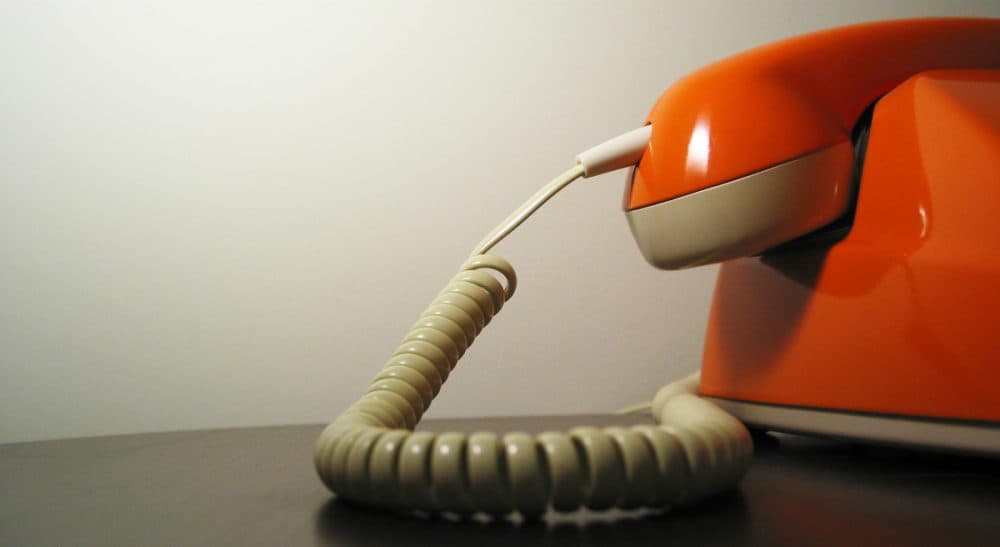Advertisement
Robocalls, And The Fine Line Between Telemarketing And Harassment

Several decades ago, I worked with a patient who had what we might now call an "anger management" problem. I liked her; but occasionally when I did things she didn’t like, I would feel the full force of her wrath. She once got a hold of my home phone number and called and hung up maybe 100 times over a weekend before I found the right thing to say to make her stop. I remember feeling pretty fried, and caught between taking the phone off the hook for hours to calm my nerves, and putting it back on because there were calls I needed to take and make.
I hadn’t thought about this nasty weekend until recently when I answered our landline only to be greeted by a man with a heavy accent, who I had already heard from several times. The instant I picked up — fooled by a fake “real looking” local number — he began reading from a script telling me he was from Microsoft, and warning me that my computer had been compromised, and advising me that I urgently needed to ...
Who knew that one of the joys of becoming a woman-of-a-certain-age in the land of the free would mean paying my phone company for the privilege of being deemed an easy mark.
I thought about telling him that I worked for the National Security Agency and was tracking him with a drone. But I then considered the lawyer’s fees paid by those charged with impersonating surveillance authorities, and, instead, I said a few unladylike things and hung up — again.
Now, having read Bruce Schneier’s excellent (and terrifying) book "Data and Goliath," all about the egregious excess of both NSA and corporate surveillance, and — relevant here — how corporations gather and sell our personal data to anyone who wants it, I’m feeling like our whole culture is as out of control as my patient was long ago. I’m very glad to be living in America, not one of the many other countries that do worse things with your data. Still, we’re long overdue for much better laws protecting our individual data — and our privacy rights generally — and better enforcement of the laws already on the books.
One among the many hair-raising corporate data stories Schneier tells, is about a company called InfoUSA that several years ago sold lists of names of “gullible seniors” — i.e. older people said to be easy to scam — to companies or individuals who wanted the opportunity to profit by exploiting them. Another company, called Teletrack, in 2011 sold lists of names of people who seemed likely to be vulnerable to being victimized by bad financial deals! Teletrack was eventually fined by the FTC. Only fined?
Someone swindles you, and then sells your phone number to a data broker who sells it to countless others so they can cheat you too? I often chastise myself for being cynical, but Schneier’s stories made me feel like a babe in the woods. They also made me wonder if my gentleman caller from Microsoft — and the many others like him who ring-a-ding all day — kept harassing me because he’d bought my name as someone who is a soft touch.
I often chastise myself for being cynical, but Schneier’s stories made me feel like a babe in the woods.
Our phone, the one registered and re-registered on the "National Do Not Call Registry,” — rings a dozen times a day with scammers, push pollsters, ladies promising to consolidate my credit card debt, companies selling me emergency medical devices, sultry voices swearing I’ve won a free cruise or a vacation time-share. And I’m not alone.
In a recent article, Consumer Reports verifies the tidal wave, and notes that the phone companies don’t help. Worse still, the publication confirms what I’d hoped was a paranoid fear on my part: If you “press 1” to talk to a real person to ask to get off their call list, you can expect more calls, not fewer. Consumer Reports urges us to sign a petition at EndRobocalls.org, and I did. But I’m not holding my breath.
I grew up in the olden days when phones were used to talk to people you cared about. Who knew that one of the joys of becoming a woman-of-a-certain-age in the land of the free would mean paying my phone company for the privilege of being deemed an easy mark.
